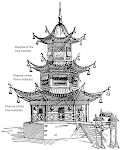2. A Brief History of the Stranger Than Fiction Doctrine of Corporate Personhood
C. The Strange Case of Santa Clara County v. Southern Pacific R.R. Co.
In the annals of history, both legal and lay, the case of Santa Clara County v. Southern Pacific R.R. Co. (1886), 118 U.S. 394, has been credited with legally establishing the court created doctrine of corporate personhood. And because of this, Justice John Marshall Harlan, the author of the opinion has been called the father of the doctrine of corporate personhood. The truth is stranger. The Santa Clara case was about whether fences on the side of the tracks should be taxed by the state government or by the local counties, and thus asked the narrow legal question: Was the assessment of the railroad companies= fences that were taxed by the state as part of the Arailway@ legal, or should the fences have been taxed by local government separately as Aother property@ improvements?
The railroad corporations argued the state assessment was invalid because the fences were not part of the Arailway@ but were Aother property@ improvements taxable only by localities. As an alternative argument the railroads argued that the assessment was invalid because the railroad companies had not received equal protection under the 14th Amendment since other corporations and natural persons received the Aother property@ status for local taxation. This question of “equal protection” of course is the question that was the lynch pin in the theory of corporate personhood and was the holy grail that the railroads and other corporations had been reaching for by bringing a multitude of cases to the Supreme Court.
The Federal Court of Appeal ruled on the equal protection issue in favor of the railroad and found that the railroad did indeed have the equal protection of the 14th Amendment, and so that court never addressed the state law issues.
When the Santa Clara Santa Clara Santa Clara
Harlan found that the appellate circuit court had ruled in backwards order, because the case should have been decided on the state law basis, not on Athe grave questions of constitutional law upon which the case was determined below.@ Justice Harlan concluded, AAs the judgment can be sustained upon this ground [of state law] it is not necessary to consider any other questions raised by the pleadings and the facts found by the court.@ Thus the corporate personhood question was never even ruled upon by the Santa Clara Santa Clara
So how is it that this case is uniquely misunderstood in the history of law and the development of the doctrine of corporate personhood? Simply, it was the later deliberate misrepresentation of the law by Supreme Court Justice Stephan J. Field. In the Santa Clara
AOne of the points made and discussed at length in the brief of counsel for defendants in error was that >Corporations are persons within the meaning of the Fourteenth Amendment to the Constitution of the United States
However, the statement of Chief Justice Waite had absolutely no force of law as it was merely the expression of his own personal opinion before arguments even began, and was not only not incorporated into Justice Harlan’s written opinion on the case, the written opinion explicitly rejected the meaning of this comment as being part of the decision on the case. Prior to this case there had been no Supreme Court decision that ever stated that corporations are persons within the meaning of the 14th Amendment, and Justice Harlan’s opinion in this case specifically stated again that the Supreme Court was not making that ruling.
Thus, the doctrine of corporate personhood was not promulgated within the authoritative opinion of court hearing the Santa Clara Santa Clara
The Real Father of Corporate Personhood
Afterwards, even though the clerk had merely inserted some of the bench comments into the summary of the case, not the opinion of the case, the Santa Clara case became known as the original source of judicial authority on the doctrine of corporate personhood due to the intentional misrepresentation by Justice Stephen J. Field, who is the real “father of corporate personhood.” How can it be said that Field’s misrepresentation was intentional? As it turns out, Justice Field of the Supreme Court was sitting on the 9th Circuit Court of Appeals at the time of the Santa Clara Washington Santa Clara Santa Clara
Who was Justice Stephan Johnson Field? He was a lawyer from New York who went to California California
Field’s career on the Supreme Court shows that he never met a corporation that he didn’t like. As soon as the 14th Amendment was adopted, Field began looking for ways to bring corporations into its penumbra. It was obvious to any observer that the 14th Amendment was originally intended to guarantee equal protection of the laws to free slaves who were now recognized to be citizens of the United States
Two years after the Santa Clara case, in Pembina Consolidated Silver Mining and Milling Company v. Pennsylvania (1988) 125 U.S.
However, in the Pembina case, Field incredibly came to the opposite conclusion as to the term “person” in the 14th Amendment’s next sentence and was able to do so because no other case had ruled on this question. In a gratuitous and superfluous statement of dicta, having nothing to do with the outcome of the Pembina case, Field wrote, AUnder the designation of person there is no doubt that a private corporation is included. Such corporations are merely associations of individuals united for a special purpose, and permitted to do business under a particular name, and have a succession of members without dissolution.@ Field provided no legal rationale whatsoever why corporations are not “citizens” since they possess only such attributes as the legislature prescribes, but are “persons” while possessing only the very same attributes. In other words, Field was doing away with the previously vital distinction between “natural” and “artificial” in the legal fiction of a corporation’s personhood.
For the first time in a Supreme Court decision, Field was stating this new doctrine without referring at all to the Santa Clara
Then finally in Minneapolis & St. Louis R. Co. v. Beckwith (1889) 129 U.S. 26, issued only a year after Pembina and three years after Santa Clara, there came a case about three hogs that had been killed by a train. Under the Iowa
In a legally fascinating sleight of hand, Field was able to turn this case into the watershed that the corporations were seeking. The court majority, with Field writing the opinion, found first that the 14th Amendment applied to corporations, but that the state law in this case had not violated the 14th Amendment because the state’s police power in enacting the law had a reasonable basis to make the law apply only to railroads and the 14th Amendment required only that like persons were treated alike, that is, that all railroad corporations be treated alike, not that all corporations be treated alike.
Then to support his unprecedented position with precedent, Field wrote: ACorporations are persons within the meaning of the clauses in the Fourteenth Amendment to the Constitution concerning the deprivation of property, and concerning the equal protection of the laws. Santa Clara County v. Southern Pacific Railroad, 118 U.S. 394, and Pembina Mining Co v. Pennsylvania , 125 U.S. Santa Clara did not make that holding and that his own opinion in Pembina didn=t even mention Santa Clara
So it was Justice Field who singlehandedly inserted the doctrine of corporate personhood into Supreme Court opinions and exploited his false citation to Santa Clara as the source of the earliest precedent for the doctrine of corporate personhood to create a false history of corporate personhood. Subsequently, people, including the Supreme Court in later decsions, have taken Field's false citation to the Santa Clara case as proof that the Santa Clara
To date, no Supreme Court case has ever directly considered and provided the legal rationale to support the argument on the original issue of whether and why corporations are included as persons under the 14th Amendment when the 14th amendment only defines persons as “persons born or naturalized in the United States,” For example, if taken at its face value, under the naked conclusion of Minneapolis & St. Louis R. Co. v. Beckwith, since corporations are persons under the 14th Amendment, corporations should be able to be elected to congress under Section 3 of the 14th Amendment that refers to persons elected to Congress.


